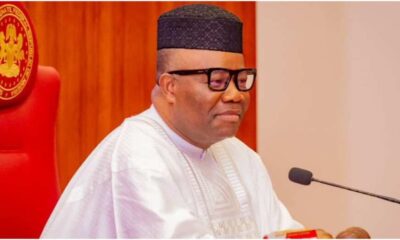- FMPWH Gets Lion’s Share as 2018 Capital Spending Hits N1.9tn
The Ministry of Power, Works, and Housing has got N347.52bn, which is the highest amount so far released to any ministry as the 2018 capital spending hit N1.9tn, reports Ifeanyi Onuba
Between June 20, 2018, when the 2018 budget was signed into law by President Muhammadu Buhari and March 29, 2019, the Federal Government has released a total of N1.9tn to finance the capital components of the 2018 budget.
The details of the amount which was released to Ministries, Departments and Agencies of government was contained in a document submitted by the Ministry of Finance to the National Assembly.
A copy of the document was obtained by our correspondent on Sunday in Abuja.
The 2018 budget, signed by President Muhammadu Buhari on June 20 last year, had total spending of N9.1tn.
The capital expenditure was to gulp 31.5 per cent of the total expenditure at N2.87tn, while recurrent non-debt spending was put at N3.51tn.
There was also a provision of N2.01tn for debt servicing which is 21 per cent of the total budget while a provision of N177bn to retire maturing bond to local contractors was made by the government.
The Ministry of Power, Works and Housing had the highest allocation with N715bn for both recurrent and capital expenditure, the Ministry of Interior was to get N577bn while N576bn was allocated to the Ministry of Defence.
The Ministry of Education was allocated N542bn; Health, N356bn; Transportation, N267bn; and Agriculture, N203bn.
In the document submitted to the lawmakers, the ministry stated that the N1.9tn included the N277bn which was released to agencies of government at the end of March, 2019.
The government stated that capital spending had been prioritised in favour of critical ongoing infrastructure projects in the power, roads, rail and agriculture sectors of the economy.
The Federal Government, according to the document, stated that the implementation of the capital component of the 2018 budget would continue until the 2019 budget was eventually passed into law by the National Assembly.
The 2019 budget, which is still undergoing legislative scrutiny, has an estimate of N8.83tn made up of N4.04tn for recurrent expenditure, N2.03tn for capital expenditure and N2.14tn for debt servicing, among others.
The document stated, “Of the total appropriation of N9.12tn, N6.99tn had been spent by December 31, 2018. This represents 77 per cent performance.
“Debt service and the implementation of non-debt recurrent expenditure, notably payment of workers’ salaries and pensions, were on track.
“Capital releases only commenced after the signing of the 2018 budget on June 20, 2018. As of March 29, 2019, a total of N1.91tn had been released for capital projects which include N277bn just released at the end of March.
“Spending on capital projects has been prioritised in favour of critical ongoing infrastructure projects in the power, roads, rail and agriculture sectors.
“Implementation of the 2018 capital budget will continue into 2019 until the 2019 budget is passed into law.”
A breakdown of the N1.91tn released for capital projects showed that the ministry of Power, Works and Housing got the highest amount of N347.52bn.
This is about 42.95 per cent of the N809.05bn which was allocated to the ministry in the 2018 budget.
This is followed by defence and security which got N205.89bn. The amount received by the sector is about 66.85 per cent of its N308bn allocation in 2018.
The document put the amount released to the agriculture and water resources sector at N152.5bn which is about 51.45 per cent of its N296.39bn allocation
In the same vein, out of the N251.42bn allocated to the transportation sector in the 2018 budget, about N127.68bn which is 50.79 per cent of the sector’s budget had been released.
For the health and education sectors, the document stated that N115.43bn had been released out of the N189.39bn allocated to the sector in the 2018 budget.
It said the sum of N186.05bn out of N323.3bn allocated to other sectors had been released by the Ministry of Finance.
Further analysis of the document showed that about N70bn out of the N100bn allocated for zonal intervention projects had been released by the Ministry of Finance.
In the same vein, N456.5bn which is 86.07 per cent of the N530.42bn allocated for statutory transfers had been released by the government.
The document also stated that the sum of N254.27bn had been released for capital supplementation. This is about 33.54 per cent of the N758.12bn allocated for the expenditure sub-head in the 2018 budget.
Some finance and economic experts said that there was a need for the Federal Government to put in place mechanisms that would help check the delay in the passage of the budget as it was affecting the rate of capital projects execution.
They said that at a time when the government was working on how to sustain the growth momentum in the economy, it was critical for funds to be released for capital projects on time.
The Lead Director, Centre for Social Justice, Eze Onyekpere, stated that the practice where the annual Federal Government budget was signed into law in the second quarter of each year was inimical to its effective implementation.
He called on the Federal Government to commence the process of enacting a new Public Finance Management Act to address the incessant delays that had characterised the country’s budget process.
The new law, according to him, would also define the framework for the engagement of stakeholders in the budget preparation as well as approval processes.
He said, “Lessons need to be learnt from this budget fiasco and this challenge will now be converted into an opportunity.
“There is a need for effective legislative collaboration in the preparation and approval of the budget, which may necessitate the amendment of section 81 of the 1999 Constitution, enactment of a new public finance management Act which sets the rules for budgeting time frames.
“In the legislature, it is also imperative that the ground rules for the approval of budgets be streamlined and modified so that no set of members of the National Assembly should be in a position to alter the consensus of the majority.”
In his comment, a Developmental Economist, Odilim Enwagbara, said there was the need for the review of the Fiscal Responsibility Act to make it define properly the timeline for the preparation of the budget.
He said with well-defined timelines for the budget process which must stipulate penalties in case of default, both the executive and the legislature would be forced to work assiduously to meet with such deadlines.
He said the delay in the passage of the budget had serious negative implications for the economy as it would affect both fiscal and monetary policies.
For instance, he said in the area of fiscal policy, the government could not release funds for the implementation of capital projects, adding that with a huge infrastructure deficit of $350bn, it would be difficult to address such infrastructure gap with a delayed budget.
He said, “To delay budget is to delay investments. If you don’t have a new budget ready to take off, how do you spend for capital projects and pay salaries and even run the government?”


 Billionaire Watch3 weeks ago
Billionaire Watch3 weeks ago
 Startups4 weeks ago
Startups4 weeks ago
 News4 weeks ago
News4 weeks ago
 News4 weeks ago
News4 weeks ago
 Bitcoin4 weeks ago
Bitcoin4 weeks ago
 Naira4 weeks ago
Naira4 weeks ago
 Forex3 weeks ago
Forex3 weeks ago
 Treasury Bills4 weeks ago
Treasury Bills4 weeks ago


























